Analysis of Leadership, Management, and Operations at Corus
VerifiedAdded on 2021/02/20
|16
|4605
|31
Report
AI Summary
This report analyzes the leadership and management practices within Corus, a major steel manufacturer. It begins by defining the roles of managers and leaders, highlighting their similarities and differences, and then explores their application in various organizational situations, such as reducing employee turnover and conflict. The report delves into the implementation of new technologies and the use of different leadership theories and models, including Systems Leadership, Situational Leadership, and Contingency Leadership. It also examines key operational management approaches like Situational Leadership, Management approach, Total Quality Management, and Six Sigma and their influence on leadership and management decisions. The report concludes with a discussion of the interplay between leadership, management, and operational practices within Corus, providing a comprehensive overview of the company's approach to achieving its goals.
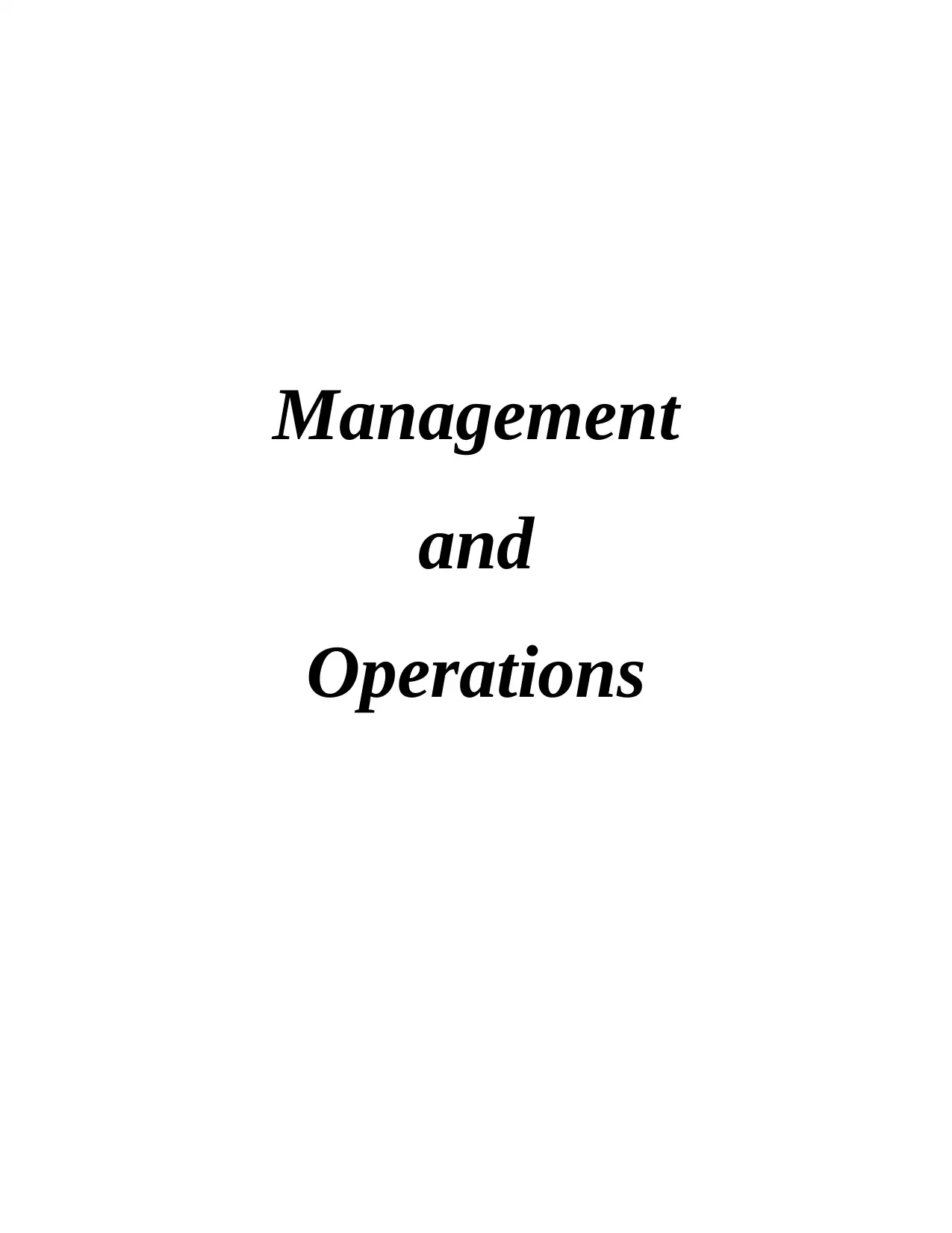
Management
and
Operations
and
Operations
Paraphrase This Document
Need a fresh take? Get an instant paraphrase of this document with our AI Paraphraser
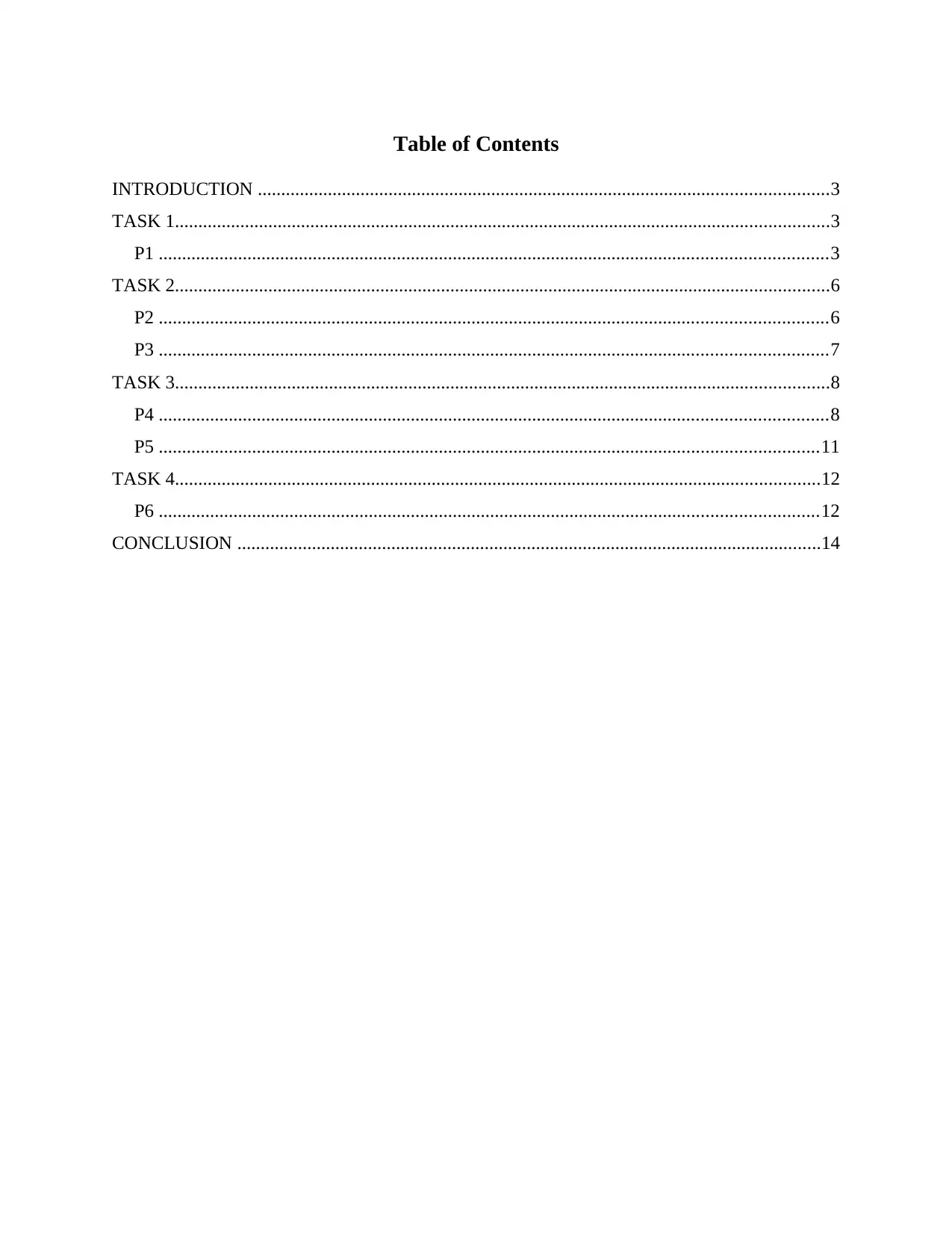
Table of Contents
INTRODUCTION ..........................................................................................................................3
TASK 1............................................................................................................................................3
P1 ...............................................................................................................................................3
TASK 2............................................................................................................................................6
P2 ...............................................................................................................................................6
P3 ...............................................................................................................................................7
TASK 3............................................................................................................................................8
P4 ...............................................................................................................................................8
P5 .............................................................................................................................................11
TASK 4..........................................................................................................................................12
P6 .............................................................................................................................................12
CONCLUSION .............................................................................................................................14
INTRODUCTION ..........................................................................................................................3
TASK 1............................................................................................................................................3
P1 ...............................................................................................................................................3
TASK 2............................................................................................................................................6
P2 ...............................................................................................................................................6
P3 ...............................................................................................................................................7
TASK 3............................................................................................................................................8
P4 ...............................................................................................................................................8
P5 .............................................................................................................................................11
TASK 4..........................................................................................................................................12
P6 .............................................................................................................................................12
CONCLUSION .............................................................................................................................14
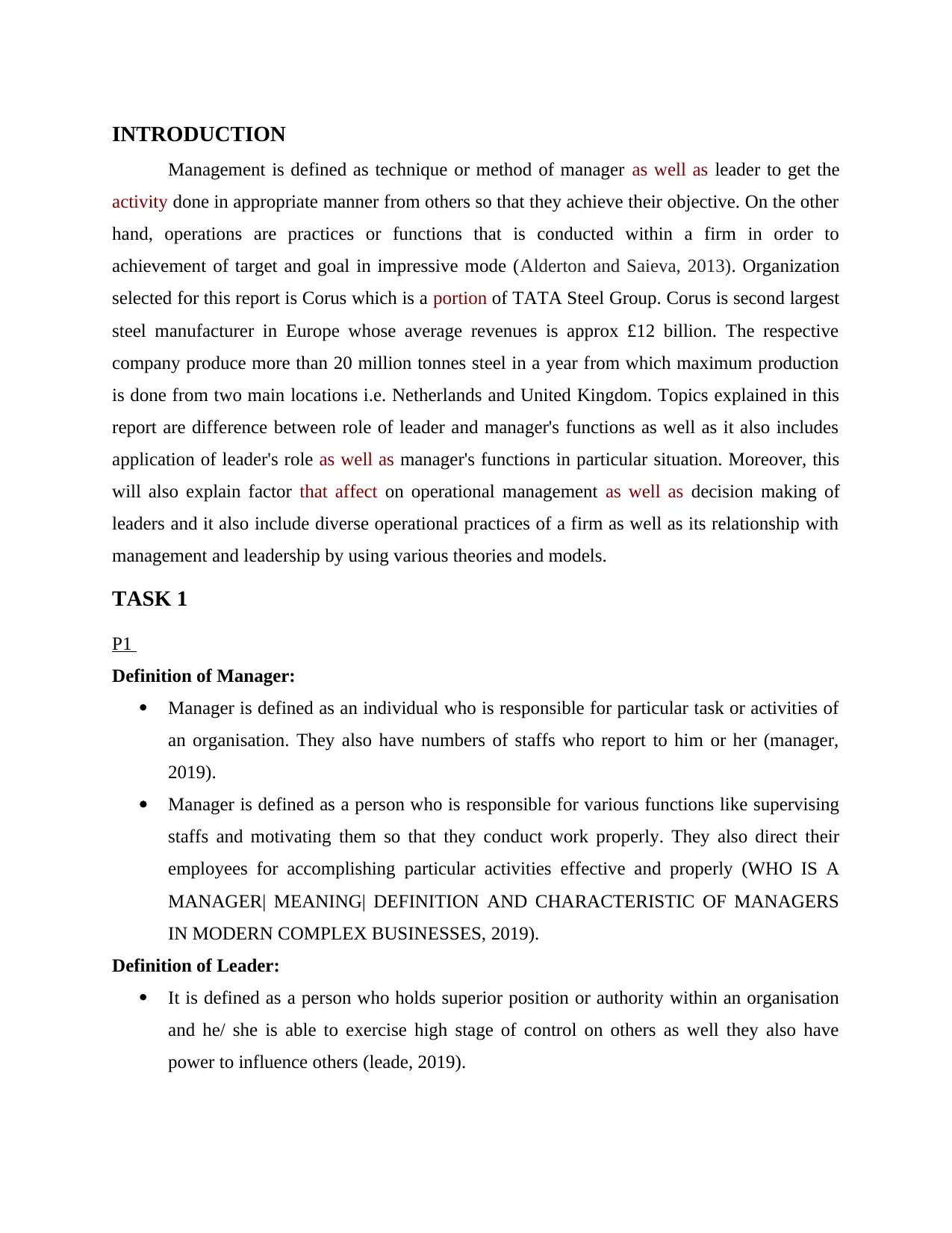
INTRODUCTION
Management is defined as technique or method of manager as well as leader to get the
activity done in appropriate manner from others so that they achieve their objective. On the other
hand, operations are practices or functions that is conducted within a firm in order to
achievement of target and goal in impressive mode (Alderton and Saieva, 2013). Organization
selected for this report is Corus which is a portion of TATA Steel Group. Corus is second largest
steel manufacturer in Europe whose average revenues is approx £12 billion. The respective
company produce more than 20 million tonnes steel in a year from which maximum production
is done from two main locations i.e. Netherlands and United Kingdom. Topics explained in this
report are difference between role of leader and manager's functions as well as it also includes
application of leader's role as well as manager's functions in particular situation. Moreover, this
will also explain factor that affect on operational management as well as decision making of
leaders and it also include diverse operational practices of a firm as well as its relationship with
management and leadership by using various theories and models.
TASK 1
P1
Definition of Manager:
Manager is defined as an individual who is responsible for particular task or activities of
an organisation. They also have numbers of staffs who report to him or her (manager,
2019).
Manager is defined as a person who is responsible for various functions like supervising
staffs and motivating them so that they conduct work properly. They also direct their
employees for accomplishing particular activities effective and properly (WHO IS A
MANAGER| MEANING| DEFINITION AND CHARACTERISTIC OF MANAGERS
IN MODERN COMPLEX BUSINESSES, 2019).
Definition of Leader:
It is defined as a person who holds superior position or authority within an organisation
and he/ she is able to exercise high stage of control on others as well they also have
power to influence others (leade, 2019).
Management is defined as technique or method of manager as well as leader to get the
activity done in appropriate manner from others so that they achieve their objective. On the other
hand, operations are practices or functions that is conducted within a firm in order to
achievement of target and goal in impressive mode (Alderton and Saieva, 2013). Organization
selected for this report is Corus which is a portion of TATA Steel Group. Corus is second largest
steel manufacturer in Europe whose average revenues is approx £12 billion. The respective
company produce more than 20 million tonnes steel in a year from which maximum production
is done from two main locations i.e. Netherlands and United Kingdom. Topics explained in this
report are difference between role of leader and manager's functions as well as it also includes
application of leader's role as well as manager's functions in particular situation. Moreover, this
will also explain factor that affect on operational management as well as decision making of
leaders and it also include diverse operational practices of a firm as well as its relationship with
management and leadership by using various theories and models.
TASK 1
P1
Definition of Manager:
Manager is defined as an individual who is responsible for particular task or activities of
an organisation. They also have numbers of staffs who report to him or her (manager,
2019).
Manager is defined as a person who is responsible for various functions like supervising
staffs and motivating them so that they conduct work properly. They also direct their
employees for accomplishing particular activities effective and properly (WHO IS A
MANAGER| MEANING| DEFINITION AND CHARACTERISTIC OF MANAGERS
IN MODERN COMPLEX BUSINESSES, 2019).
Definition of Leader:
It is defined as a person who holds superior position or authority within an organisation
and he/ she is able to exercise high stage of control on others as well they also have
power to influence others (leade, 2019).
⊘ This is a preview!⊘
Do you want full access?
Subscribe today to unlock all pages.

Trusted by 1+ million students worldwide
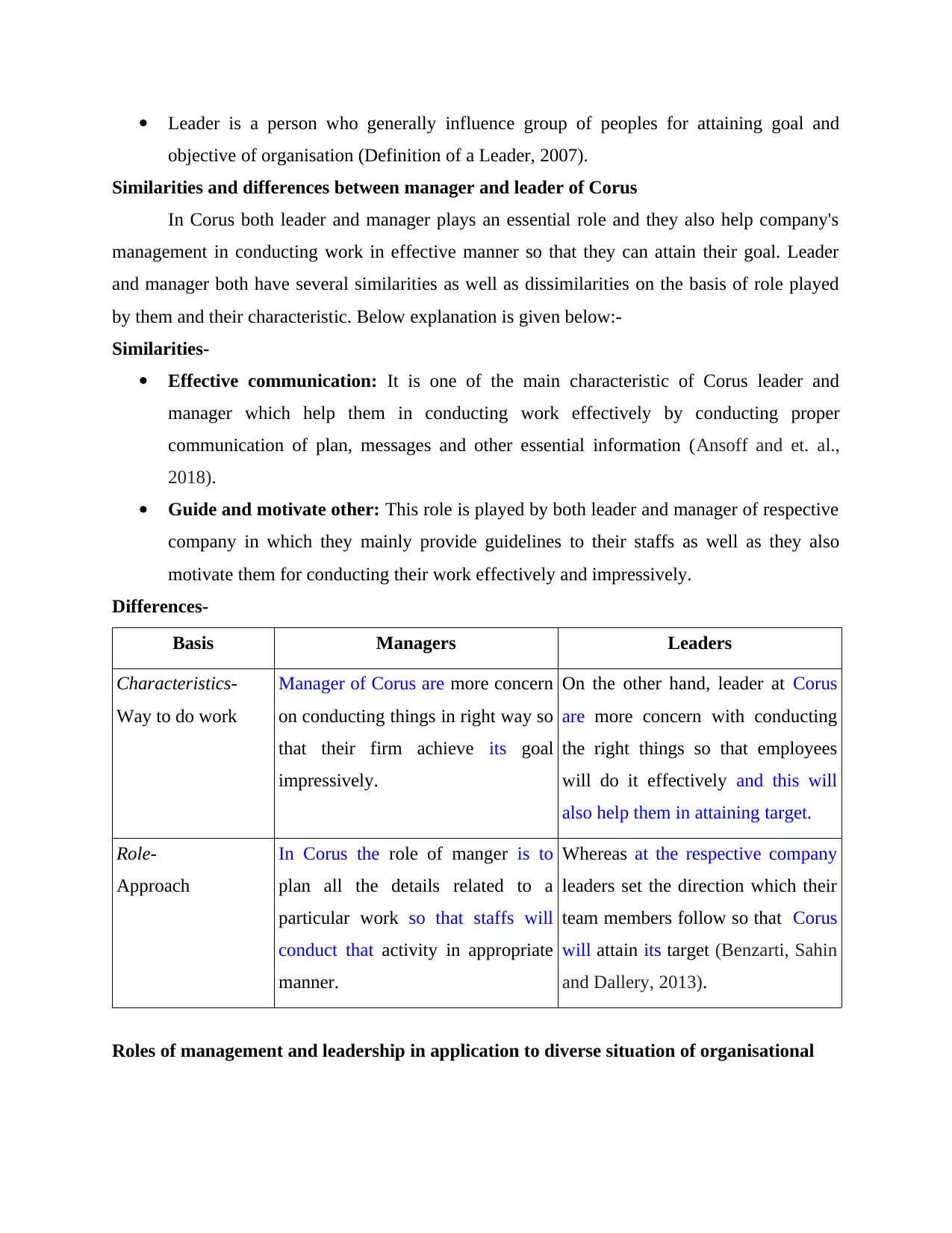
Leader is a person who generally influence group of peoples for attaining goal and
objective of organisation (Definition of a Leader, 2007).
Similarities and differences between manager and leader of Corus
In Corus both leader and manager plays an essential role and they also help company's
management in conducting work in effective manner so that they can attain their goal. Leader
and manager both have several similarities as well as dissimilarities on the basis of role played
by them and their characteristic. Below explanation is given below:-
Similarities-
Effective communication: It is one of the main characteristic of Corus leader and
manager which help them in conducting work effectively by conducting proper
communication of plan, messages and other essential information (Ansoff and et. al.,
2018).
Guide and motivate other: This role is played by both leader and manager of respective
company in which they mainly provide guidelines to their staffs as well as they also
motivate them for conducting their work effectively and impressively.
Differences-
Basis Managers Leaders
Characteristics-
Way to do work
Manager of Corus are more concern
on conducting things in right way so
that their firm achieve its goal
impressively.
On the other hand, leader at Corus
are more concern with conducting
the right things so that employees
will do it effectively and this will
also help them in attaining target.
Role-
Approach
In Corus the role of manger is to
plan all the details related to a
particular work so that staffs will
conduct that activity in appropriate
manner.
Whereas at the respective company
leaders set the direction which their
team members follow so that Corus
will attain its target (Benzarti, Sahin
and Dallery, 2013).
Roles of management and leadership in application to diverse situation of organisational
objective of organisation (Definition of a Leader, 2007).
Similarities and differences between manager and leader of Corus
In Corus both leader and manager plays an essential role and they also help company's
management in conducting work in effective manner so that they can attain their goal. Leader
and manager both have several similarities as well as dissimilarities on the basis of role played
by them and their characteristic. Below explanation is given below:-
Similarities-
Effective communication: It is one of the main characteristic of Corus leader and
manager which help them in conducting work effectively by conducting proper
communication of plan, messages and other essential information (Ansoff and et. al.,
2018).
Guide and motivate other: This role is played by both leader and manager of respective
company in which they mainly provide guidelines to their staffs as well as they also
motivate them for conducting their work effectively and impressively.
Differences-
Basis Managers Leaders
Characteristics-
Way to do work
Manager of Corus are more concern
on conducting things in right way so
that their firm achieve its goal
impressively.
On the other hand, leader at Corus
are more concern with conducting
the right things so that employees
will do it effectively and this will
also help them in attaining target.
Role-
Approach
In Corus the role of manger is to
plan all the details related to a
particular work so that staffs will
conduct that activity in appropriate
manner.
Whereas at the respective company
leaders set the direction which their
team members follow so that Corus
will attain its target (Benzarti, Sahin
and Dallery, 2013).
Roles of management and leadership in application to diverse situation of organisational
Paraphrase This Document
Need a fresh take? Get an instant paraphrase of this document with our AI Paraphraser
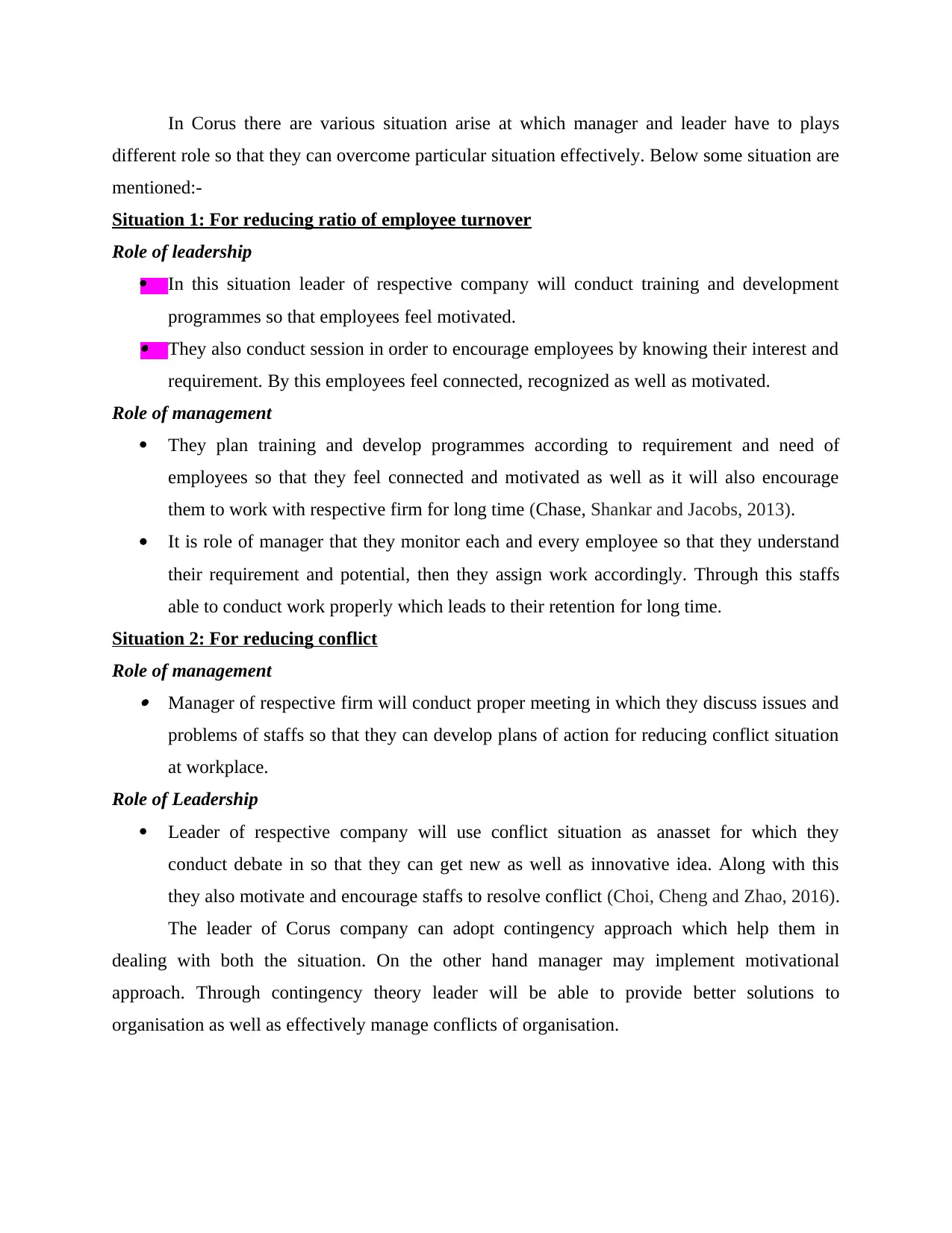
In Corus there are various situation arise at which manager and leader have to plays
different role so that they can overcome particular situation effectively. Below some situation are
mentioned:-
Situation 1: For reducing ratio of employee turnover
Role of leadership
In this situation leader of respective company will conduct training and development
programmes so that employees feel motivated. They also conduct session in order to encourage employees by knowing their interest and
requirement. By this employees feel connected, recognized as well as motivated.
Role of management
They plan training and develop programmes according to requirement and need of
employees so that they feel connected and motivated as well as it will also encourage
them to work with respective firm for long time (Chase, Shankar and Jacobs, 2013).
It is role of manager that they monitor each and every employee so that they understand
their requirement and potential, then they assign work accordingly. Through this staffs
able to conduct work properly which leads to their retention for long time.
Situation 2: For reducing conflict
Role of management Manager of respective firm will conduct proper meeting in which they discuss issues and
problems of staffs so that they can develop plans of action for reducing conflict situation
at workplace.
Role of Leadership
Leader of respective company will use conflict situation as anasset for which they
conduct debate in so that they can get new as well as innovative idea. Along with this
they also motivate and encourage staffs to resolve conflict (Choi, Cheng and Zhao, 2016).
The leader of Corus company can adopt contingency approach which help them in
dealing with both the situation. On the other hand manager may implement motivational
approach. Through contingency theory leader will be able to provide better solutions to
organisation as well as effectively manage conflicts of organisation.
different role so that they can overcome particular situation effectively. Below some situation are
mentioned:-
Situation 1: For reducing ratio of employee turnover
Role of leadership
In this situation leader of respective company will conduct training and development
programmes so that employees feel motivated. They also conduct session in order to encourage employees by knowing their interest and
requirement. By this employees feel connected, recognized as well as motivated.
Role of management
They plan training and develop programmes according to requirement and need of
employees so that they feel connected and motivated as well as it will also encourage
them to work with respective firm for long time (Chase, Shankar and Jacobs, 2013).
It is role of manager that they monitor each and every employee so that they understand
their requirement and potential, then they assign work accordingly. Through this staffs
able to conduct work properly which leads to their retention for long time.
Situation 2: For reducing conflict
Role of management Manager of respective firm will conduct proper meeting in which they discuss issues and
problems of staffs so that they can develop plans of action for reducing conflict situation
at workplace.
Role of Leadership
Leader of respective company will use conflict situation as anasset for which they
conduct debate in so that they can get new as well as innovative idea. Along with this
they also motivate and encourage staffs to resolve conflict (Choi, Cheng and Zhao, 2016).
The leader of Corus company can adopt contingency approach which help them in
dealing with both the situation. On the other hand manager may implement motivational
approach. Through contingency theory leader will be able to provide better solutions to
organisation as well as effectively manage conflicts of organisation.
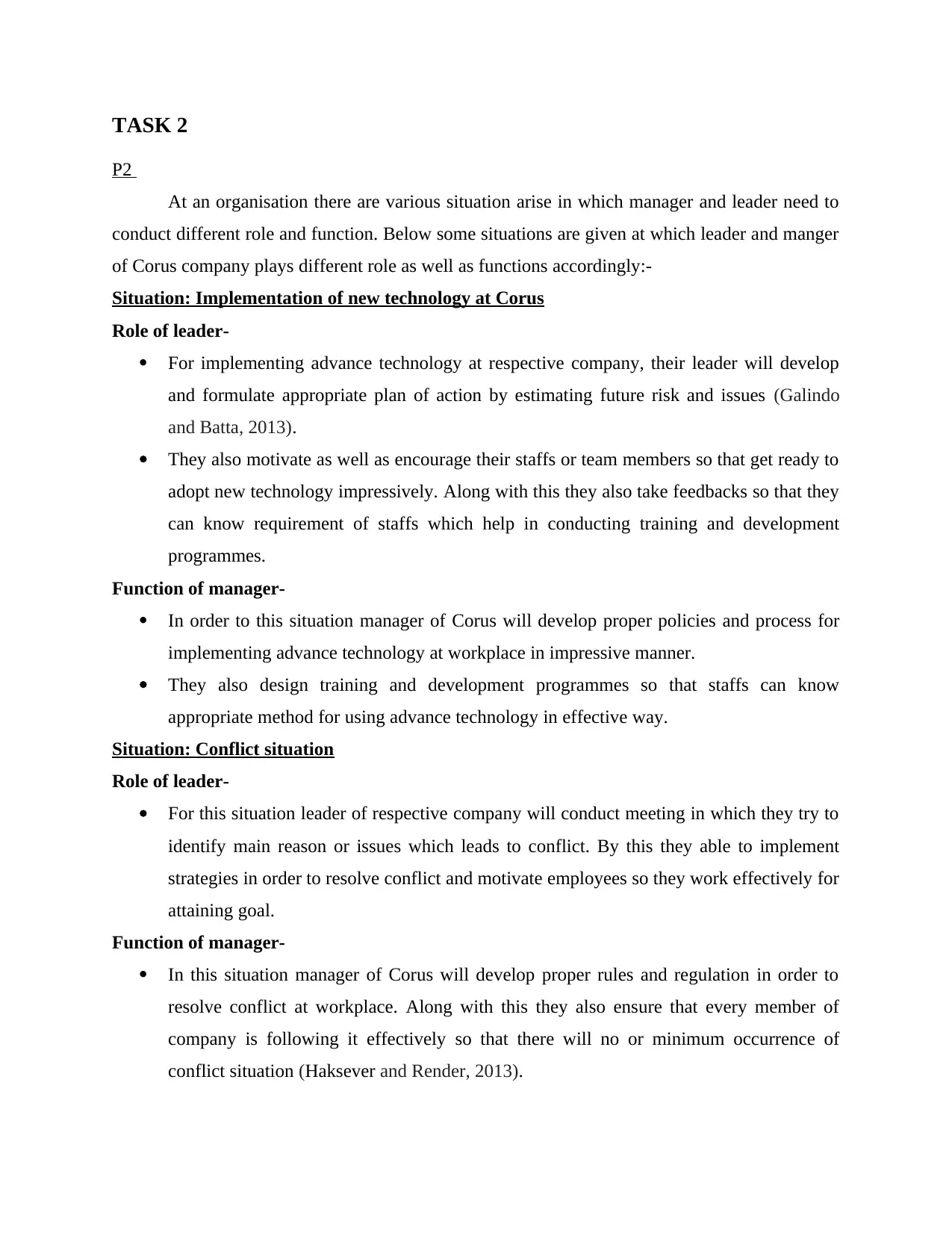
TASK 2
P2
At an organisation there are various situation arise in which manager and leader need to
conduct different role and function. Below some situations are given at which leader and manger
of Corus company plays different role as well as functions accordingly:-
Situation: Implementation of new technology at Corus
Role of leader-
For implementing advance technology at respective company, their leader will develop
and formulate appropriate plan of action by estimating future risk and issues (Galindo
and Batta, 2013).
They also motivate as well as encourage their staffs or team members so that get ready to
adopt new technology impressively. Along with this they also take feedbacks so that they
can know requirement of staffs which help in conducting training and development
programmes.
Function of manager-
In order to this situation manager of Corus will develop proper policies and process for
implementing advance technology at workplace in impressive manner.
They also design training and development programmes so that staffs can know
appropriate method for using advance technology in effective way.
Situation: Conflict situation
Role of leader-
For this situation leader of respective company will conduct meeting in which they try to
identify main reason or issues which leads to conflict. By this they able to implement
strategies in order to resolve conflict and motivate employees so they work effectively for
attaining goal.
Function of manager-
In this situation manager of Corus will develop proper rules and regulation in order to
resolve conflict at workplace. Along with this they also ensure that every member of
company is following it effectively so that there will no or minimum occurrence of
conflict situation (Haksever and Render, 2013).
P2
At an organisation there are various situation arise in which manager and leader need to
conduct different role and function. Below some situations are given at which leader and manger
of Corus company plays different role as well as functions accordingly:-
Situation: Implementation of new technology at Corus
Role of leader-
For implementing advance technology at respective company, their leader will develop
and formulate appropriate plan of action by estimating future risk and issues (Galindo
and Batta, 2013).
They also motivate as well as encourage their staffs or team members so that get ready to
adopt new technology impressively. Along with this they also take feedbacks so that they
can know requirement of staffs which help in conducting training and development
programmes.
Function of manager-
In order to this situation manager of Corus will develop proper policies and process for
implementing advance technology at workplace in impressive manner.
They also design training and development programmes so that staffs can know
appropriate method for using advance technology in effective way.
Situation: Conflict situation
Role of leader-
For this situation leader of respective company will conduct meeting in which they try to
identify main reason or issues which leads to conflict. By this they able to implement
strategies in order to resolve conflict and motivate employees so they work effectively for
attaining goal.
Function of manager-
In this situation manager of Corus will develop proper rules and regulation in order to
resolve conflict at workplace. Along with this they also ensure that every member of
company is following it effectively so that there will no or minimum occurrence of
conflict situation (Haksever and Render, 2013).
⊘ This is a preview!⊘
Do you want full access?
Subscribe today to unlock all pages.

Trusted by 1+ million students worldwide
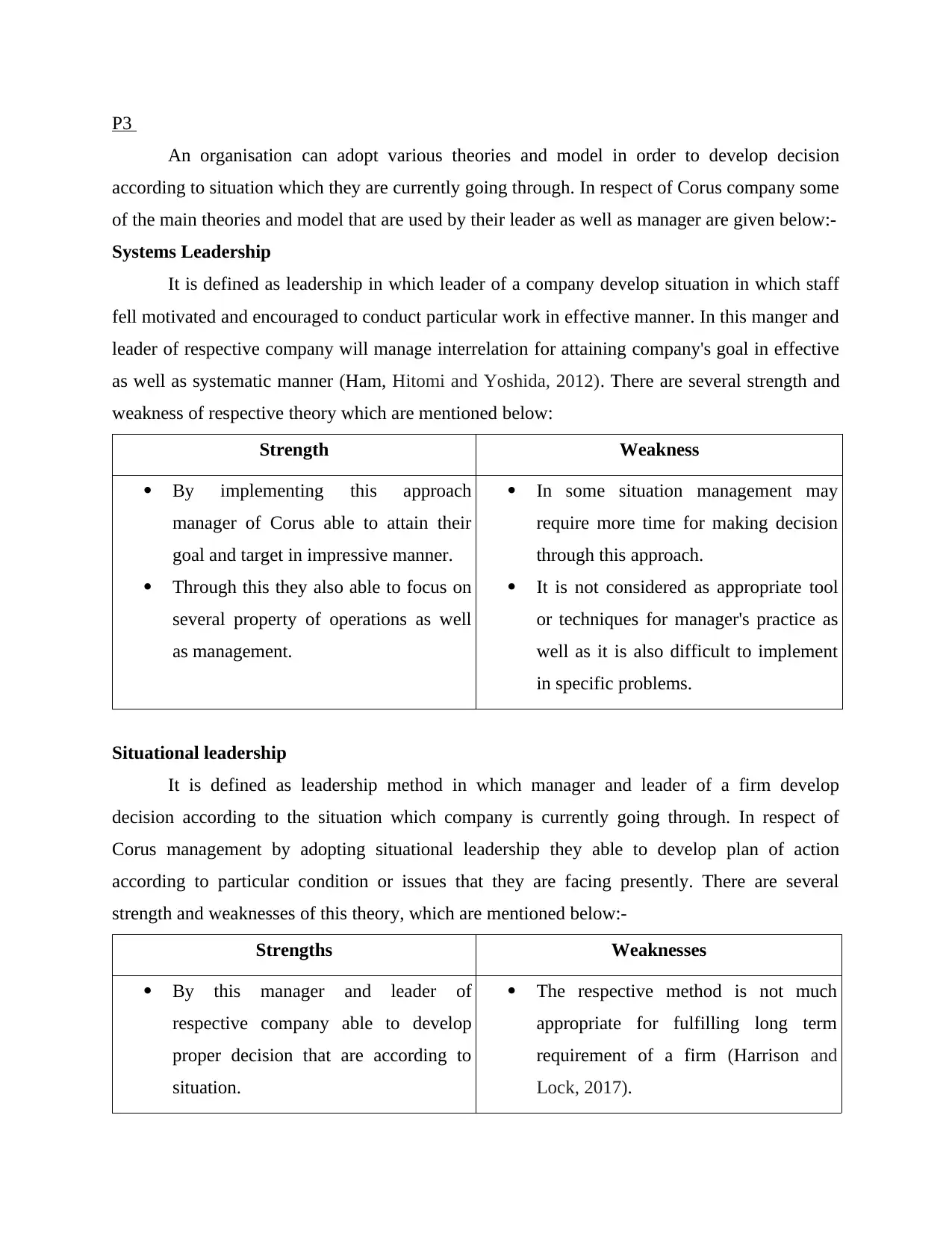
P3
An organisation can adopt various theories and model in order to develop decision
according to situation which they are currently going through. In respect of Corus company some
of the main theories and model that are used by their leader as well as manager are given below:-
Systems Leadership
It is defined as leadership in which leader of a company develop situation in which staff
fell motivated and encouraged to conduct particular work in effective manner. In this manger and
leader of respective company will manage interrelation for attaining company's goal in effective
as well as systematic manner (Ham, Hitomi and Yoshida, 2012). There are several strength and
weakness of respective theory which are mentioned below:
Strength Weakness
By implementing this approach
manager of Corus able to attain their
goal and target in impressive manner.
Through this they also able to focus on
several property of operations as well
as management.
In some situation management may
require more time for making decision
through this approach.
It is not considered as appropriate tool
or techniques for manager's practice as
well as it is also difficult to implement
in specific problems.
Situational leadership
It is defined as leadership method in which manager and leader of a firm develop
decision according to the situation which company is currently going through. In respect of
Corus management by adopting situational leadership they able to develop plan of action
according to particular condition or issues that they are facing presently. There are several
strength and weaknesses of this theory, which are mentioned below:-
Strengths Weaknesses
By this manager and leader of
respective company able to develop
proper decision that are according to
situation.
The respective method is not much
appropriate for fulfilling long term
requirement of a firm (Harrison and
Lock, 2017).
An organisation can adopt various theories and model in order to develop decision
according to situation which they are currently going through. In respect of Corus company some
of the main theories and model that are used by their leader as well as manager are given below:-
Systems Leadership
It is defined as leadership in which leader of a company develop situation in which staff
fell motivated and encouraged to conduct particular work in effective manner. In this manger and
leader of respective company will manage interrelation for attaining company's goal in effective
as well as systematic manner (Ham, Hitomi and Yoshida, 2012). There are several strength and
weakness of respective theory which are mentioned below:
Strength Weakness
By implementing this approach
manager of Corus able to attain their
goal and target in impressive manner.
Through this they also able to focus on
several property of operations as well
as management.
In some situation management may
require more time for making decision
through this approach.
It is not considered as appropriate tool
or techniques for manager's practice as
well as it is also difficult to implement
in specific problems.
Situational leadership
It is defined as leadership method in which manager and leader of a firm develop
decision according to the situation which company is currently going through. In respect of
Corus management by adopting situational leadership they able to develop plan of action
according to particular condition or issues that they are facing presently. There are several
strength and weaknesses of this theory, which are mentioned below:-
Strengths Weaknesses
By this manager and leader of
respective company able to develop
proper decision that are according to
situation.
The respective method is not much
appropriate for fulfilling long term
requirement of a firm (Harrison and
Lock, 2017).
Paraphrase This Document
Need a fresh take? Get an instant paraphrase of this document with our AI Paraphraser
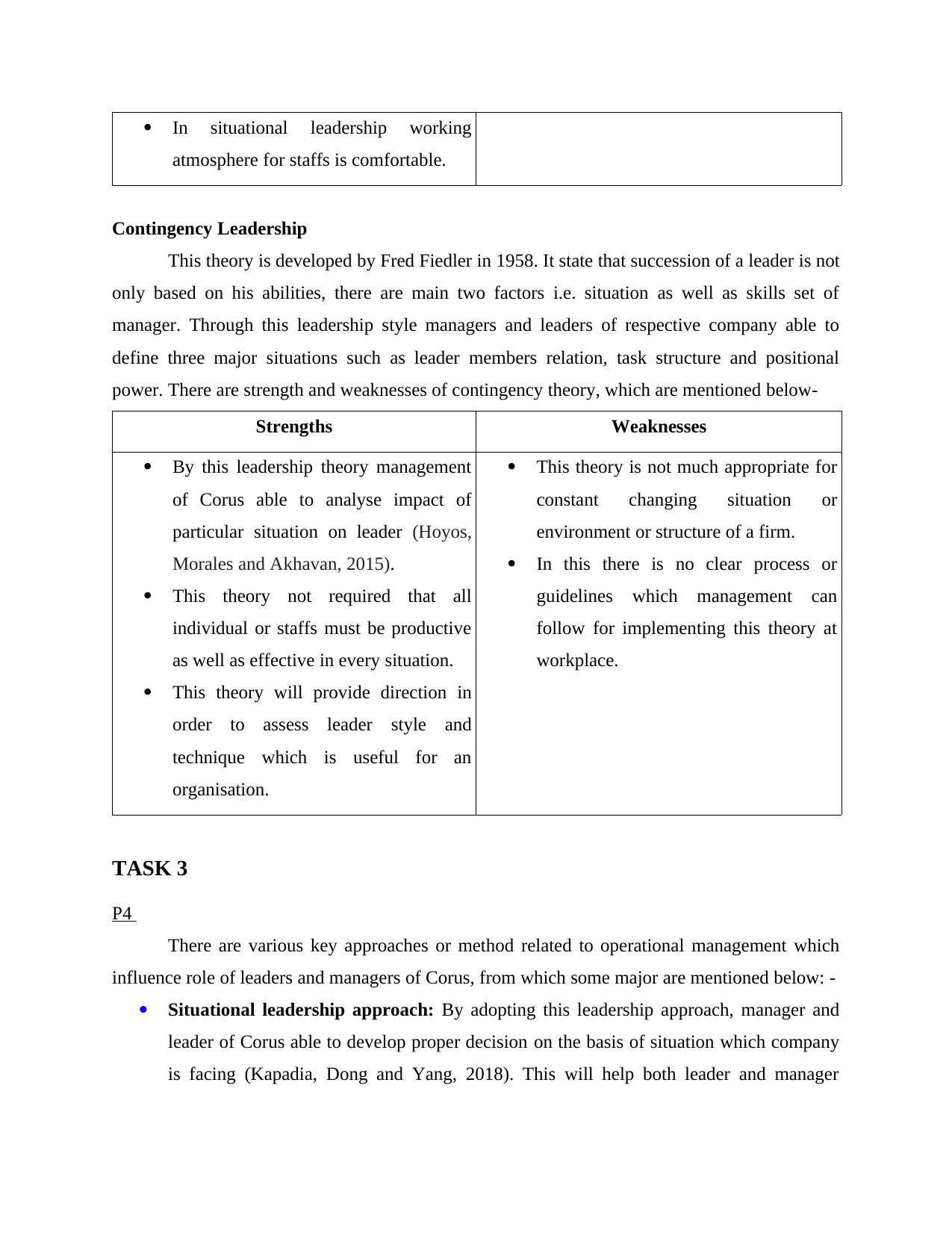
In situational leadership working
atmosphere for staffs is comfortable.
Contingency Leadership
This theory is developed by Fred Fiedler in 1958. It state that succession of a leader is not
only based on his abilities, there are main two factors i.e. situation as well as skills set of
manager. Through this leadership style managers and leaders of respective company able to
define three major situations such as leader members relation, task structure and positional
power. There are strength and weaknesses of contingency theory, which are mentioned below-
Strengths Weaknesses
By this leadership theory management
of Corus able to analyse impact of
particular situation on leader (Hoyos,
Morales and Akhavan, 2015).
This theory not required that all
individual or staffs must be productive
as well as effective in every situation.
This theory will provide direction in
order to assess leader style and
technique which is useful for an
organisation.
This theory is not much appropriate for
constant changing situation or
environment or structure of a firm.
In this there is no clear process or
guidelines which management can
follow for implementing this theory at
workplace.
TASK 3
P4
There are various key approaches or method related to operational management which
influence role of leaders and managers of Corus, from which some major are mentioned below: -
Situational leadership approach: By adopting this leadership approach, manager and
leader of Corus able to develop proper decision on the basis of situation which company
is facing (Kapadia, Dong and Yang, 2018). This will help both leader and manager
atmosphere for staffs is comfortable.
Contingency Leadership
This theory is developed by Fred Fiedler in 1958. It state that succession of a leader is not
only based on his abilities, there are main two factors i.e. situation as well as skills set of
manager. Through this leadership style managers and leaders of respective company able to
define three major situations such as leader members relation, task structure and positional
power. There are strength and weaknesses of contingency theory, which are mentioned below-
Strengths Weaknesses
By this leadership theory management
of Corus able to analyse impact of
particular situation on leader (Hoyos,
Morales and Akhavan, 2015).
This theory not required that all
individual or staffs must be productive
as well as effective in every situation.
This theory will provide direction in
order to assess leader style and
technique which is useful for an
organisation.
This theory is not much appropriate for
constant changing situation or
environment or structure of a firm.
In this there is no clear process or
guidelines which management can
follow for implementing this theory at
workplace.
TASK 3
P4
There are various key approaches or method related to operational management which
influence role of leaders and managers of Corus, from which some major are mentioned below: -
Situational leadership approach: By adopting this leadership approach, manager and
leader of Corus able to develop proper decision on the basis of situation which company
is facing (Kapadia, Dong and Yang, 2018). This will help both leader and manager
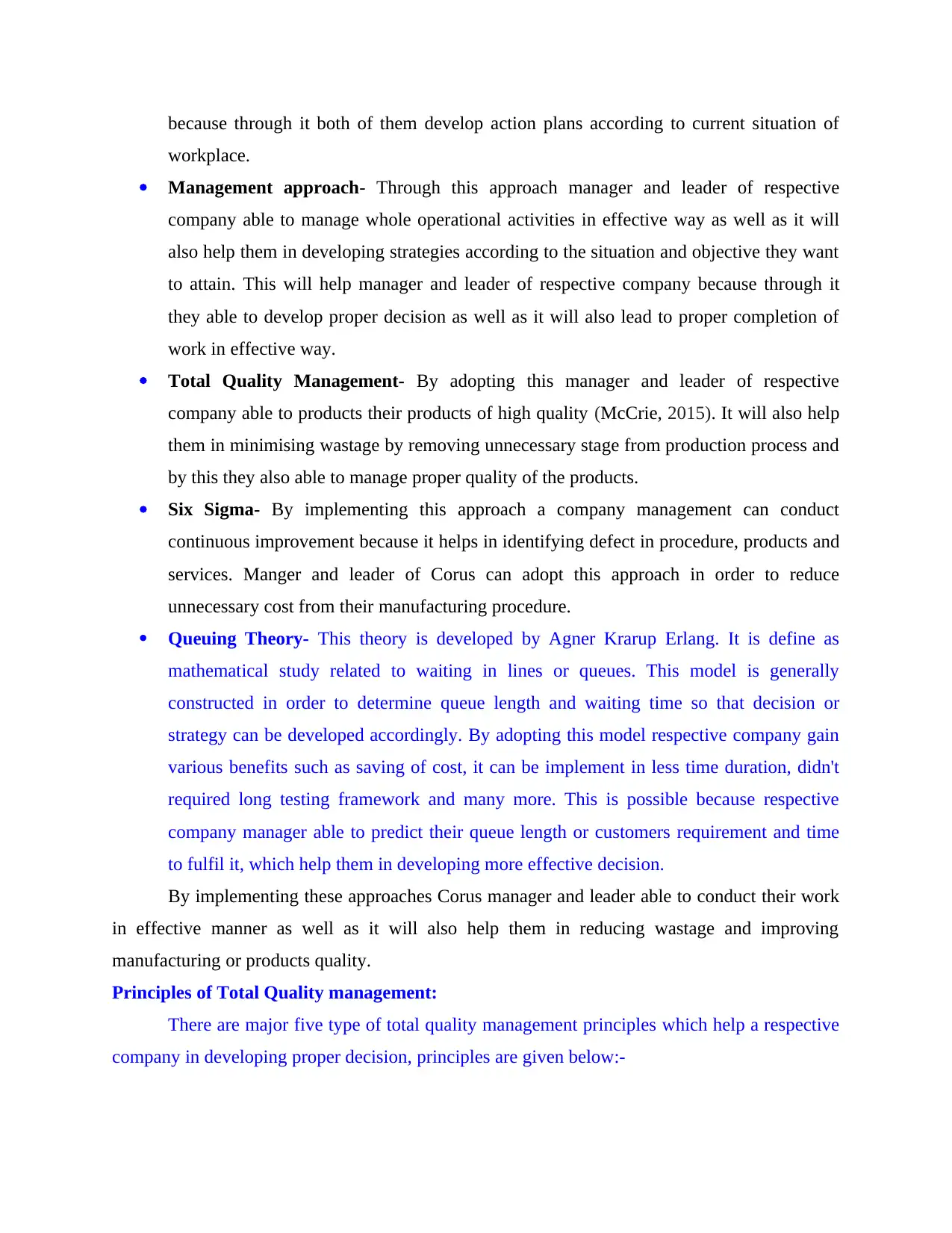
because through it both of them develop action plans according to current situation of
workplace.
Management approach- Through this approach manager and leader of respective
company able to manage whole operational activities in effective way as well as it will
also help them in developing strategies according to the situation and objective they want
to attain. This will help manager and leader of respective company because through it
they able to develop proper decision as well as it will also lead to proper completion of
work in effective way.
Total Quality Management- By adopting this manager and leader of respective
company able to products their products of high quality (McCrie, 2015). It will also help
them in minimising wastage by removing unnecessary stage from production process and
by this they also able to manage proper quality of the products.
Six Sigma- By implementing this approach a company management can conduct
continuous improvement because it helps in identifying defect in procedure, products and
services. Manger and leader of Corus can adopt this approach in order to reduce
unnecessary cost from their manufacturing procedure.
Queuing Theory- This theory is developed by Agner Krarup Erlang. It is define as
mathematical study related to waiting in lines or queues. This model is generally
constructed in order to determine queue length and waiting time so that decision or
strategy can be developed accordingly. By adopting this model respective company gain
various benefits such as saving of cost, it can be implement in less time duration, didn't
required long testing framework and many more. This is possible because respective
company manager able to predict their queue length or customers requirement and time
to fulfil it, which help them in developing more effective decision.
By implementing these approaches Corus manager and leader able to conduct their work
in effective manner as well as it will also help them in reducing wastage and improving
manufacturing or products quality.
Principles of Total Quality management:
There are major five type of total quality management principles which help a respective
company in developing proper decision, principles are given below:-
workplace.
Management approach- Through this approach manager and leader of respective
company able to manage whole operational activities in effective way as well as it will
also help them in developing strategies according to the situation and objective they want
to attain. This will help manager and leader of respective company because through it
they able to develop proper decision as well as it will also lead to proper completion of
work in effective way.
Total Quality Management- By adopting this manager and leader of respective
company able to products their products of high quality (McCrie, 2015). It will also help
them in minimising wastage by removing unnecessary stage from production process and
by this they also able to manage proper quality of the products.
Six Sigma- By implementing this approach a company management can conduct
continuous improvement because it helps in identifying defect in procedure, products and
services. Manger and leader of Corus can adopt this approach in order to reduce
unnecessary cost from their manufacturing procedure.
Queuing Theory- This theory is developed by Agner Krarup Erlang. It is define as
mathematical study related to waiting in lines or queues. This model is generally
constructed in order to determine queue length and waiting time so that decision or
strategy can be developed accordingly. By adopting this model respective company gain
various benefits such as saving of cost, it can be implement in less time duration, didn't
required long testing framework and many more. This is possible because respective
company manager able to predict their queue length or customers requirement and time
to fulfil it, which help them in developing more effective decision.
By implementing these approaches Corus manager and leader able to conduct their work
in effective manner as well as it will also help them in reducing wastage and improving
manufacturing or products quality.
Principles of Total Quality management:
There are major five type of total quality management principles which help a respective
company in developing proper decision, principles are given below:-
⊘ This is a preview!⊘
Do you want full access?
Subscribe today to unlock all pages.

Trusted by 1+ million students worldwide
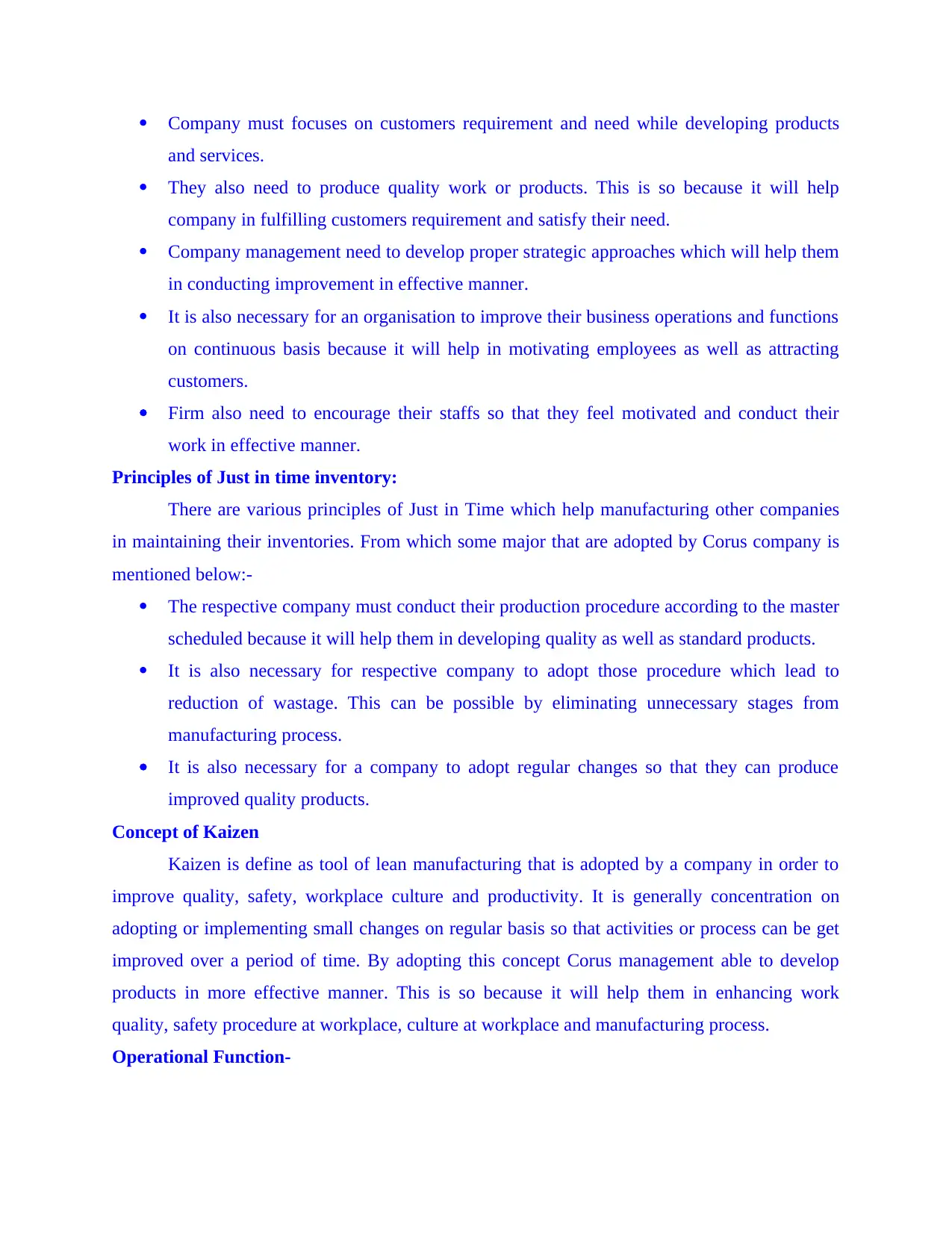
Company must focuses on customers requirement and need while developing products
and services.
They also need to produce quality work or products. This is so because it will help
company in fulfilling customers requirement and satisfy their need.
Company management need to develop proper strategic approaches which will help them
in conducting improvement in effective manner.
It is also necessary for an organisation to improve their business operations and functions
on continuous basis because it will help in motivating employees as well as attracting
customers.
Firm also need to encourage their staffs so that they feel motivated and conduct their
work in effective manner.
Principles of Just in time inventory:
There are various principles of Just in Time which help manufacturing other companies
in maintaining their inventories. From which some major that are adopted by Corus company is
mentioned below:-
The respective company must conduct their production procedure according to the master
scheduled because it will help them in developing quality as well as standard products.
It is also necessary for respective company to adopt those procedure which lead to
reduction of wastage. This can be possible by eliminating unnecessary stages from
manufacturing process.
It is also necessary for a company to adopt regular changes so that they can produce
improved quality products.
Concept of Kaizen
Kaizen is define as tool of lean manufacturing that is adopted by a company in order to
improve quality, safety, workplace culture and productivity. It is generally concentration on
adopting or implementing small changes on regular basis so that activities or process can be get
improved over a period of time. By adopting this concept Corus management able to develop
products in more effective manner. This is so because it will help them in enhancing work
quality, safety procedure at workplace, culture at workplace and manufacturing process.
Operational Function-
and services.
They also need to produce quality work or products. This is so because it will help
company in fulfilling customers requirement and satisfy their need.
Company management need to develop proper strategic approaches which will help them
in conducting improvement in effective manner.
It is also necessary for an organisation to improve their business operations and functions
on continuous basis because it will help in motivating employees as well as attracting
customers.
Firm also need to encourage their staffs so that they feel motivated and conduct their
work in effective manner.
Principles of Just in time inventory:
There are various principles of Just in Time which help manufacturing other companies
in maintaining their inventories. From which some major that are adopted by Corus company is
mentioned below:-
The respective company must conduct their production procedure according to the master
scheduled because it will help them in developing quality as well as standard products.
It is also necessary for respective company to adopt those procedure which lead to
reduction of wastage. This can be possible by eliminating unnecessary stages from
manufacturing process.
It is also necessary for a company to adopt regular changes so that they can produce
improved quality products.
Concept of Kaizen
Kaizen is define as tool of lean manufacturing that is adopted by a company in order to
improve quality, safety, workplace culture and productivity. It is generally concentration on
adopting or implementing small changes on regular basis so that activities or process can be get
improved over a period of time. By adopting this concept Corus management able to develop
products in more effective manner. This is so because it will help them in enhancing work
quality, safety procedure at workplace, culture at workplace and manufacturing process.
Operational Function-
Paraphrase This Document
Need a fresh take? Get an instant paraphrase of this document with our AI Paraphraser
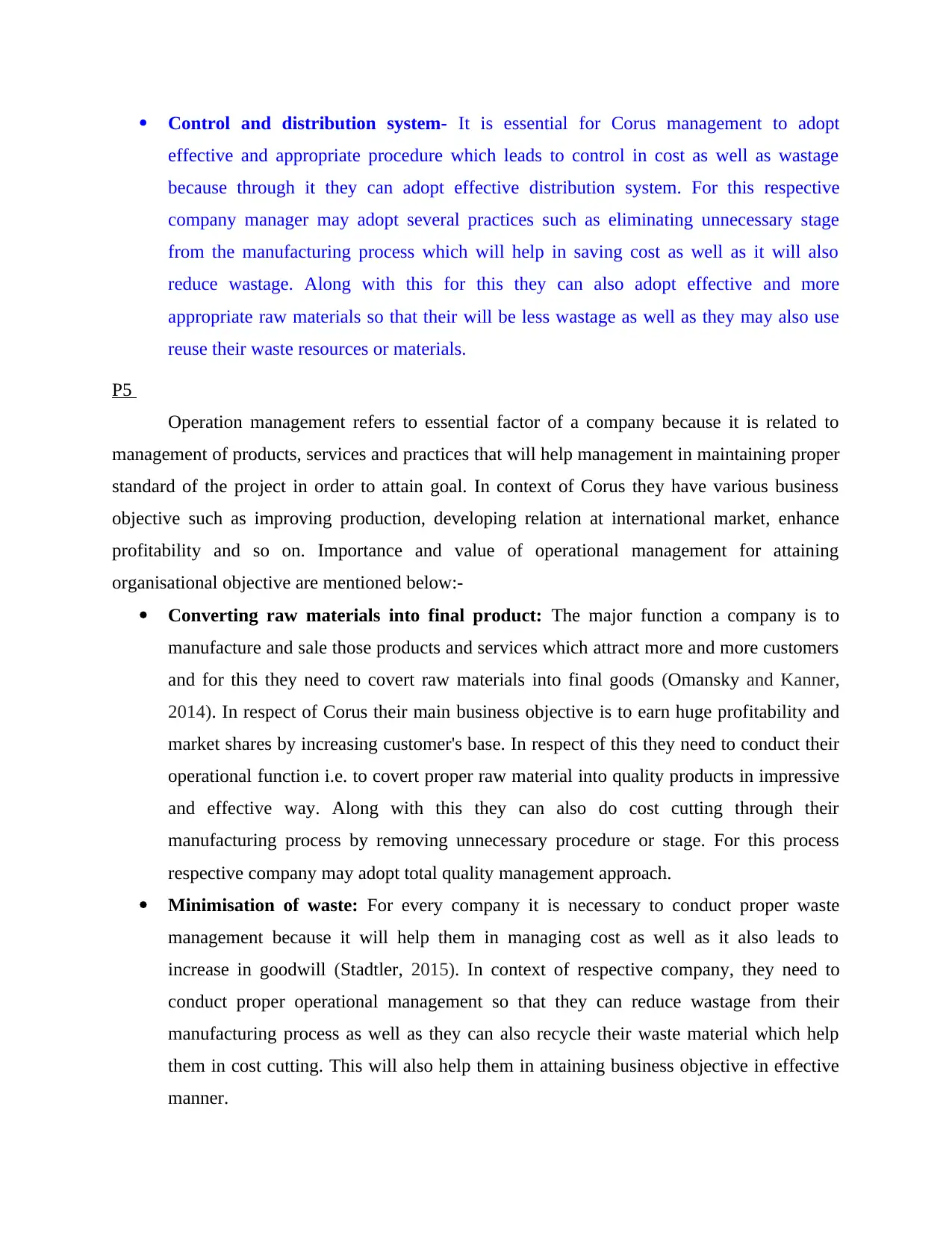
Control and distribution system- It is essential for Corus management to adopt
effective and appropriate procedure which leads to control in cost as well as wastage
because through it they can adopt effective distribution system. For this respective
company manager may adopt several practices such as eliminating unnecessary stage
from the manufacturing process which will help in saving cost as well as it will also
reduce wastage. Along with this for this they can also adopt effective and more
appropriate raw materials so that their will be less wastage as well as they may also use
reuse their waste resources or materials.
P5
Operation management refers to essential factor of a company because it is related to
management of products, services and practices that will help management in maintaining proper
standard of the project in order to attain goal. In context of Corus they have various business
objective such as improving production, developing relation at international market, enhance
profitability and so on. Importance and value of operational management for attaining
organisational objective are mentioned below:-
Converting raw materials into final product: The major function a company is to
manufacture and sale those products and services which attract more and more customers
and for this they need to covert raw materials into final goods (Omansky and Kanner,
2014). In respect of Corus their main business objective is to earn huge profitability and
market shares by increasing customer's base. In respect of this they need to conduct their
operational function i.e. to covert proper raw material into quality products in impressive
and effective way. Along with this they can also do cost cutting through their
manufacturing process by removing unnecessary procedure or stage. For this process
respective company may adopt total quality management approach.
Minimisation of waste: For every company it is necessary to conduct proper waste
management because it will help them in managing cost as well as it also leads to
increase in goodwill (Stadtler, 2015). In context of respective company, they need to
conduct proper operational management so that they can reduce wastage from their
manufacturing process as well as they can also recycle their waste material which help
them in cost cutting. This will also help them in attaining business objective in effective
manner.
effective and appropriate procedure which leads to control in cost as well as wastage
because through it they can adopt effective distribution system. For this respective
company manager may adopt several practices such as eliminating unnecessary stage
from the manufacturing process which will help in saving cost as well as it will also
reduce wastage. Along with this for this they can also adopt effective and more
appropriate raw materials so that their will be less wastage as well as they may also use
reuse their waste resources or materials.
P5
Operation management refers to essential factor of a company because it is related to
management of products, services and practices that will help management in maintaining proper
standard of the project in order to attain goal. In context of Corus they have various business
objective such as improving production, developing relation at international market, enhance
profitability and so on. Importance and value of operational management for attaining
organisational objective are mentioned below:-
Converting raw materials into final product: The major function a company is to
manufacture and sale those products and services which attract more and more customers
and for this they need to covert raw materials into final goods (Omansky and Kanner,
2014). In respect of Corus their main business objective is to earn huge profitability and
market shares by increasing customer's base. In respect of this they need to conduct their
operational function i.e. to covert proper raw material into quality products in impressive
and effective way. Along with this they can also do cost cutting through their
manufacturing process by removing unnecessary procedure or stage. For this process
respective company may adopt total quality management approach.
Minimisation of waste: For every company it is necessary to conduct proper waste
management because it will help them in managing cost as well as it also leads to
increase in goodwill (Stadtler, 2015). In context of respective company, they need to
conduct proper operational management so that they can reduce wastage from their
manufacturing process as well as they can also recycle their waste material which help
them in cost cutting. This will also help them in attaining business objective in effective
manner.
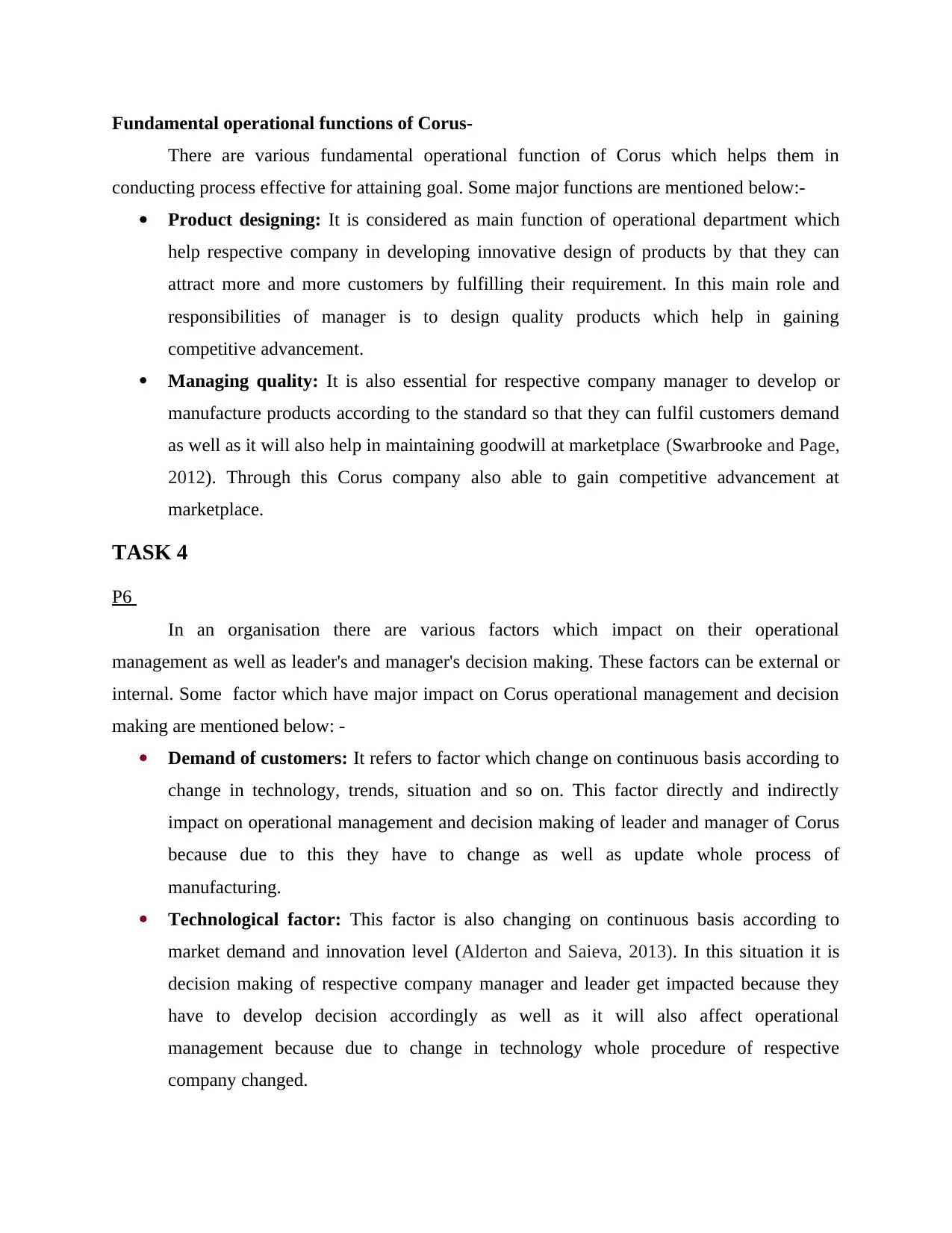
Fundamental operational functions of Corus-
There are various fundamental operational function of Corus which helps them in
conducting process effective for attaining goal. Some major functions are mentioned below:-
Product designing: It is considered as main function of operational department which
help respective company in developing innovative design of products by that they can
attract more and more customers by fulfilling their requirement. In this main role and
responsibilities of manager is to design quality products which help in gaining
competitive advancement.
Managing quality: It is also essential for respective company manager to develop or
manufacture products according to the standard so that they can fulfil customers demand
as well as it will also help in maintaining goodwill at marketplace (Swarbrooke and Page,
2012). Through this Corus company also able to gain competitive advancement at
marketplace.
TASK 4
P6
In an organisation there are various factors which impact on their operational
management as well as leader's and manager's decision making. These factors can be external or
internal. Some factor which have major impact on Corus operational management and decision
making are mentioned below: -
Demand of customers: It refers to factor which change on continuous basis according to
change in technology, trends, situation and so on. This factor directly and indirectly
impact on operational management and decision making of leader and manager of Corus
because due to this they have to change as well as update whole process of
manufacturing.
Technological factor: This factor is also changing on continuous basis according to
market demand and innovation level (Alderton and Saieva, 2013). In this situation it is
decision making of respective company manager and leader get impacted because they
have to develop decision accordingly as well as it will also affect operational
management because due to change in technology whole procedure of respective
company changed.
There are various fundamental operational function of Corus which helps them in
conducting process effective for attaining goal. Some major functions are mentioned below:-
Product designing: It is considered as main function of operational department which
help respective company in developing innovative design of products by that they can
attract more and more customers by fulfilling their requirement. In this main role and
responsibilities of manager is to design quality products which help in gaining
competitive advancement.
Managing quality: It is also essential for respective company manager to develop or
manufacture products according to the standard so that they can fulfil customers demand
as well as it will also help in maintaining goodwill at marketplace (Swarbrooke and Page,
2012). Through this Corus company also able to gain competitive advancement at
marketplace.
TASK 4
P6
In an organisation there are various factors which impact on their operational
management as well as leader's and manager's decision making. These factors can be external or
internal. Some factor which have major impact on Corus operational management and decision
making are mentioned below: -
Demand of customers: It refers to factor which change on continuous basis according to
change in technology, trends, situation and so on. This factor directly and indirectly
impact on operational management and decision making of leader and manager of Corus
because due to this they have to change as well as update whole process of
manufacturing.
Technological factor: This factor is also changing on continuous basis according to
market demand and innovation level (Alderton and Saieva, 2013). In this situation it is
decision making of respective company manager and leader get impacted because they
have to develop decision accordingly as well as it will also affect operational
management because due to change in technology whole procedure of respective
company changed.
⊘ This is a preview!⊘
Do you want full access?
Subscribe today to unlock all pages.

Trusted by 1+ million students worldwide
1 out of 16
Related Documents
Your All-in-One AI-Powered Toolkit for Academic Success.
+13062052269
info@desklib.com
Available 24*7 on WhatsApp / Email
![[object Object]](/_next/static/media/star-bottom.7253800d.svg)
Unlock your academic potential
Copyright © 2020–2026 A2Z Services. All Rights Reserved. Developed and managed by ZUCOL.





